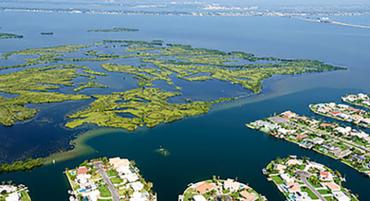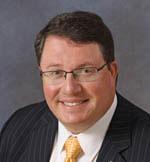
Floridians owe a debt to Randy Fine. During the last six months, the South Brevard County Republican quietly made himself an environmental hero, a champion for the Indian River Lagoon.
Outraged over Brevard's illegal dumping of 22,782,439 gallons of raw sewage into the Indian River in 21 separate releases from Sept. 11 to Oct. 19, 2017, Fine has been a man possessed -- working to compel the county to fix its infrastructure so it never happens again.
This week he succeeded.
Fine issued a statement Thursday saying Brevard County would be compelled to spend more than $12 million on sewage system repairs under a consent order prepared by the Department of Environmental Protection with input from Fine’s office. DEP has confirmed it.

“Given some of our local politicians’ fervent efforts to prioritize non-essential pork-barrel projects and special interest giveaways over their legal obligation to stop raw sewage releases, I asked the DEP to ‘drop the hammer’ on the politicians until they own up to their responsibilities," Fine said.
The consent decree requires the County Commission to complete three projects by the end of 2020: the completion of 3.5 miles of force main on North Riverside Drive between Eau Gallie and Oakland Avenue in Indialantic; complete $1.9 million of clay pipe rehabilitation in seven collection basins in the South Beaches; and complete smoke testing of sewage pipes in Satellite Beach.
Fine, chairman of the Brevard County Legislative Delegation, lashed out at county commissioners last October. He called on them to reverse their decision to spend $14.5 million on “pork barrel” projects in the aftermath of the county dumping more than 20 million gallons of raw sewage into the IRL."
During an Oct. 11 Brevard County Commission meeting, commissioners had voted 4-1 to spend 14.5 million tax dollars on these:
-
$7 million for an “indoor multiuse sports arena and hotel project” in Titusville.
-
$5 million for upgrades to the Viera Regional Park’s soccer and lacrosse fields.
-
$1.7 million to expand a campground at Palm Bay Regional Park
-
$500,000 for a “Keepers Cottage Museum” at the Cape Canaveral Lighthouse, and
-
$200,000 to upgrade a pier area in Indian Harbour Beach near where the 20 million gallons of sewage were deposited.
“Instead of repairing and modernizing the sewage system, they decided to spend taxpayer money to make it easier for kayakers to paddle through the sewage. It defies logic," he said. "It defies explanation.
"This dereliction of duty raises questions about whether our County Commission is fit to oversee the county, or whether more aggressive steps need to be taken to ensure our citizens are served."
Fine told reporters in October, “When I got into politics, I knew that the politicians thought differently than those of us who live in the real world.
“But you have to question the sanity of people who thought spending money on a pier next to a raw sewage dump was a better idea than actually fixing the raw sewage dump.”
He asked, "... How can we ask the citizenry to make changes to their septic tanks, or limit fertilizer use, or hook up to sewer systems, when the local politicians are not a trusted partner at the local level?"

Fine then took his cause to the 2018 session, developing legislation and winning the Legislature's approval for more flexibility in how tourist development taxes can be spent.
To get the job done, he convinced Rep. Paul Renner, R-Palm Coast, who chairs the House Ways and Means Committee and sponsored the 103-page tax reform package, to tack his proposals onto that -- House Bill 7087.
Tourist development options now will include lagoon projects and, under certain circumstances, roads, sidewalks, bike paths, boardwalks, drainage projects, solid waste facilities and other capital project that would directly grow tourism.
Tourism is an annual $2.1 billion industry in Brevard, responsible for 26,137 jobs.
The Brevard County Commission must vote to accept the consent order, and if it does, the county will have to report to the state on its progress and actions moving forward.
Scientists confirm the water in the lagoon is brown not only because of algae, but because "sewage is one of the things, along with fertilizer runoff from lawns, that makes the brown algae grow."
A county spokesman told WESH 2 News work was already underway on a 10-year sewer upgrade project. The DEP order means the project will be reprioritized to address the biggest problem areas.
The bottom line is, because of Fine's dogged, personal campaign -- first to try to awaken county government's environmental conscience, then to craft, compromise and push through legislation, and finally work with DEP -- Brevard and other counties facing sewage crises have an option they didn't have before to do the right thing for Florida waterways.
Reach Nancy Smith at nsmith@sunshinestatenews.com or at 228-282-2423. Twitter: @NancyLBSmith


